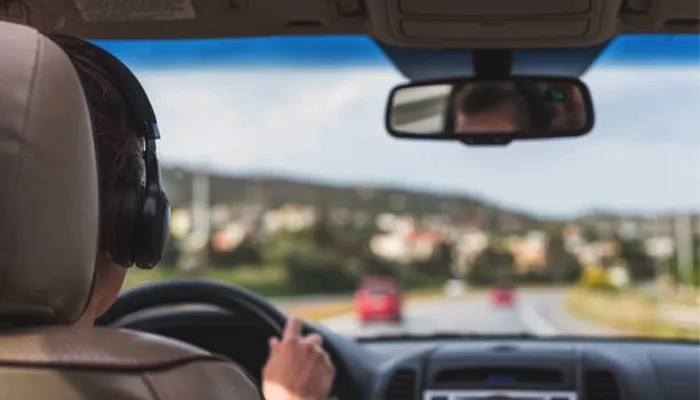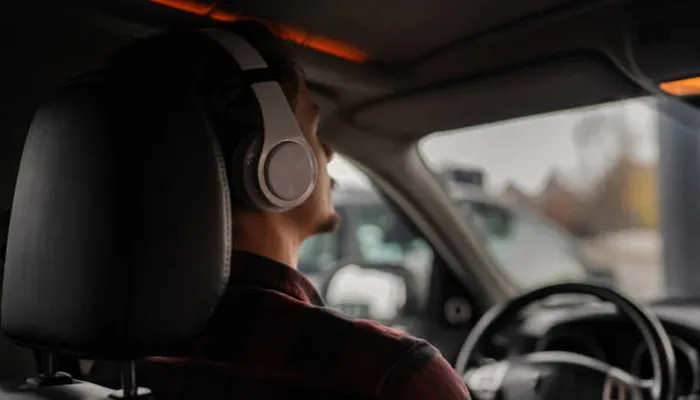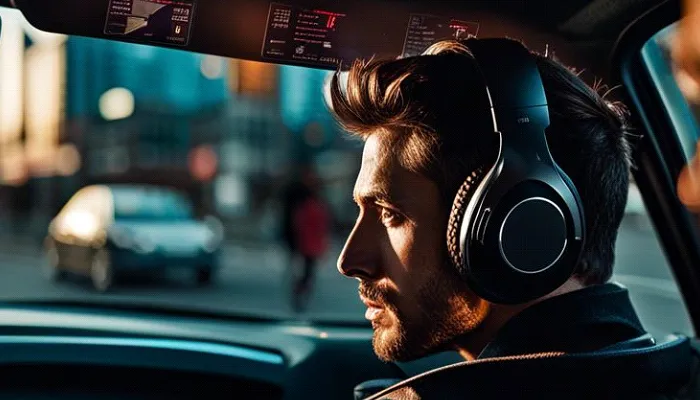Are you unsure if it’s a good idea to wear noise-cancelling headphones while driving? After all, current laws regarding this issue can be confusing and inconsistent. This article will clarify the legal aspects of wearing headphones while behind the wheel, along with addressing performance and safety concerns.
Stay tuned for some life-saving information!
The Legality of Wearing Headphones While Driving
Different states have different laws regarding the legality of wearing headphones while driving, and it is important to be aware of the rules in your specific state.
Laws in different states
The legality of using headphones while driving varies across different states. Here’s a simple overview of the headphone laws in a few selected states:
| Illegal | Legal |
|---|---|
| Maryland | Alabama |
| Alaska | Washington D.C |
| California | Hawaii |
| Florida | Indiana |
| Louisiana | Kansas |
| Minnesota | Kentucky |
| Illinois | New Mexico |
| Washington | North Carolina |
| New York | Texas |
| Pennsylvania | South Carolina |
| Rhode Island | Wisconsin |
Some states have laws prohibiting or restricting the use of headphones while driving, while others consider it careless driving.
Remember, even if it’s technically legal in your state, wearing headphones while driving can potentially make you legally vulnerable. Always prioritize safety over convenience on the road.
Exceptions to the rule
While most states have strict restrictions on wearing headphones while driving, there are few exceptions. Professional drivers operating in high noise environments are permitted to use special noise-cancelling devices for hearing protection.
This exception serves to safeguard their auditory health against the constant barrage of loud engine sounds and road noises.
Also, some locations offer a loophole where only one ear is covered by an earphone or headphone – thus maintaining a level of ambient audio awareness from the other ear.
However, it’s crucial to note that these exceptions do not fully validate or encourage the behavior of using headphones while behind the wheel.
Even with such exemptions in place, many traffic laws emphasize distraction-free driving as a top priority for everyone’s safety on roads.
Therefore, even if you can legally sport your favorite noise cancelling headphones in Michigan or Washington state doesn’t mean it’s always safe or smart option while cruising down highways and city streets.

The Impact of Noise Cancelling Headphones on Driving Performance
Wearing noise cancelling headphones while driving can lead to reduced situational awareness, increased reaction time, potential for distracted driving, impaired communication, and increased driver fatigue.
Reduced situational awareness
Driving with noise canceling headphones can significantly reduce your situational awareness, a crucial requirement for safe driving.
Imagine cruising down your favorite scenic highway without the usual cacophony – it might sound appealing until you realize that the comforting silence also silences essential audio cues.
The purr of an approaching vehicle, the beep of a car horn or even the wail of emergency sirens becomes muted. This lackadaisical approach to auditory feedback could lead to dangerously late reactions or worse still, no reaction at all as vital warnings go unnoticed.
So although tempting, experts like Texas car accident attorneys directly advise against such practices due to these significant safety risks involved.
Increased reaction time
Wearing noise cancelling headphones while driving can lead to increased reaction time, putting you and others on the road at risk.
When you wear these headphones, it becomes harder to hear important sounds such as sirens, honking horns, or screeching tires.
This delay in reacting to auditory cues can be dangerous when you need to quickly respond to a potential hazard or emergency situation.
In fact, studies have shown that wearing headphones while driving can significantly impair your ability to react in a timely manner.
It’s crucial for young drivers like yourselves to prioritize road safety by avoiding any distractions that may hinder your ability to respond quickly and effectively on the road.
Potential for distracted driving
Wearing noise cancelling headphones while driving can pose a significant risk of distracted driving. These headphones create a barrier between you and the sounds of the road, making it harder to hear important cues like honking horns or sirens.
This reduced situational awareness can lead to delayed reaction times in critical situations and increase your chances of being involved in an accident.
Additionally, wearing headphones may tempt you to fiddle with music settings or take calls, further diverting your attention from the road ahead.
It’s essential to prioritize safety and avoid using these headphones while driving to ensure you’re fully focused on the task at hand – getting safely from point A to point B.
Impaired communication
When wearing noise cancelling headphones while driving, one major concern is impaired communication. These headphones are specifically designed to block out external sounds, which means you may not be able to hear important auditory cues on the road, such as honking horns or emergency vehicle sirens.
This can significantly impact your ability to communicate with other drivers and respond appropriately in dangerous situations.
It’s crucial to be aware of your surroundings and maintain clear communication while driving for the safety of yourself and others on the road.
Increased driver fatigue
Driving while wearing noise cancelling headphones can lead to increased driver fatigue. When you have noise cancelling headphones on, you may not be able to hear important sounds around you, such as sirens or honking horns.
This can cause a constant state of alertness and strain on your cognitive abilities, leading to increased mental exhaustion and tiredness behind the wheel.
Studies have shown that prolonged use of noise cancelling headphones can contribute to decreased performance and slower reaction times while driving.
It is crucial to prioritize your safety and avoid activities that can impair your driving abilities, including wearing noise cancelling headphones.

Safety Tips for Using Noise Cancelling Headphones While Driving
To ensure safe driving while using noise cancelling headphones, consider alternatives such as Bluetooth hands-free devices or car speaker systems.
Alternatives to wearing headphones
- Use a Bluetooth hands – free device or speakerphone for phone calls.
- Utilize voice commands on your smartphone for navigation and music control.
- Invest in a car stereo system with Bluetooth connectivity.
- Use noise isolating headphones that still allow you to hear ambient sounds.
- Opt for open-back headphones that provide a more natural sound experience without completely blocking external noises.
- Create a playlist or download podcasts or audiobooks to listen to before you start driving, so you won’t need headphones while on the road.
- Take breaks during long drives to rest your ears and reduce fatigue.
- Practice mindfulness and focus on the road without relying on any audio distractions.
Tips for maintaining focus and minimizing distractions
- Stay focused on the road at all times by avoiding any distractions, including using headphones while driving.
- Create a distraction – free environment in your car by keeping your phone out of reach and turning off notifications.
- If you need to listen to music or podcasts while driving, opt for a hands – free device such as a Bluetooth speaker or car audio system.
- Plan your playlist or audio content before you start driving to minimize the need for adjustments while on the road.
- Avoid engaging in activities that require intense concentration or focus, such as watching videos or playing games, while driving.
- Take regular breaks during long drives to combat driver fatigue and maintain mental alertness.
- If you find it difficult to resist the temptation of using headphones while driving, consider seeking alternatives like audiobooks or radio stations instead.
Hearing protection for professional drivers
Professional drivers, such as truckers and delivery drivers, often spend long hours on the road. It’s important for them to protect their hearing from prolonged exposure to loud noises like engine sounds or traffic noise.
However, wearing noise cancelling headphones while driving can be risky and potentially illegal in some states. Instead, professional drivers should consider using alternatives like earplugs specifically designed for driving.
These earplugs reduce external noise without completely blocking it out, allowing drivers to maintain situational awareness and hear important sounds like sirens or honking horns.
By prioritizing their safety and finding alternative solutions, professional drivers can protect their hearing without compromising their ability to drive safely.
The Risks and Consequences of Wearing Noise Cancelling Headphones While Driving
Wearing noise-cancelling headphones while driving may seem tempting for those who want to block out distractions and enjoy their favorite tunes, but it comes with serious risks and consequences.
1. First and foremost, wearing headphones can significantly reduce situational awareness on the road. Without being able to hear important cues like approaching sirens or honking horns, you may miss crucial information that could prevent an accident.
2. Additionally, wearing headphones can increase reaction time as your brain struggles to process auditory information alongside visual stimuli. This delay in response could be the difference between avoiding a collision or not.
3. Not only does wearing headphones impair communication with other drivers through car horns or verbal warnings, but it also poses a greater risk of distraction.
4. When your attention is focused on music or podcasts playing directly into your ears, it becomes harder to maintain concentration on the road ahead.
5. Distracted driving is one of the leading causes of accidents, and by choosing to wear noise-cancelling headphones behind the wheel, you are actively engaging in this dangerous behavior.
6. Driver fatigue is another consequence of wearing noise-cancelling headphones while driving. By shutting yourself off from external sounds and immersing yourself solely in audio entertainment, there is a higher chance of experiencing mental exhaustion during long drives.
7. This can lead to decreased alertness and compromised judgment when making split-second decisions on the road.
8. To ensure safety while driving without compromising sound isolation completely, consider using alternative methods such as open-ear bone conduction headphones that allow ambient sounds to penetrate while still providing audio enjoyment at lower volumes.
9. Implementing strategies such as practicing mindfulness techniques or taking regular breaks during lengthy trips can also help minimize distractions and improve focus.
In conclusion, although it may be tempting to wear noise-cancelling headphones while driving for personal enjoyment reasons; doing so presents significant risks that compromise both yours and others’ safety on the road.
It’s essential to prioritize situational awareness and maintain full concentration when operating a vehicle. So, let’s put safety first and keep the noise-cancelling headphones off while driving.
Conclusion
In conclusion, wearing noise cancelling headphones while driving is a safety risk and can have serious consequences. While it may be legal in some states, it is not recommended due to the potential for reduced situational awareness, increased reaction time, and distracted driving.
It’s important to prioritize road safety by avoiding the use of headphones while operating a vehicle.
- Charging Bluetooth Headphones During Use: Is It Possible? - January 9, 2024
- Why Over-Ear Headphones Best for Hearing Health? (7 Reasons) - December 12, 2023
- Fixing the Bose Earbuds Not Charging in Case Problem: Solutions That Work - November 24, 2023
